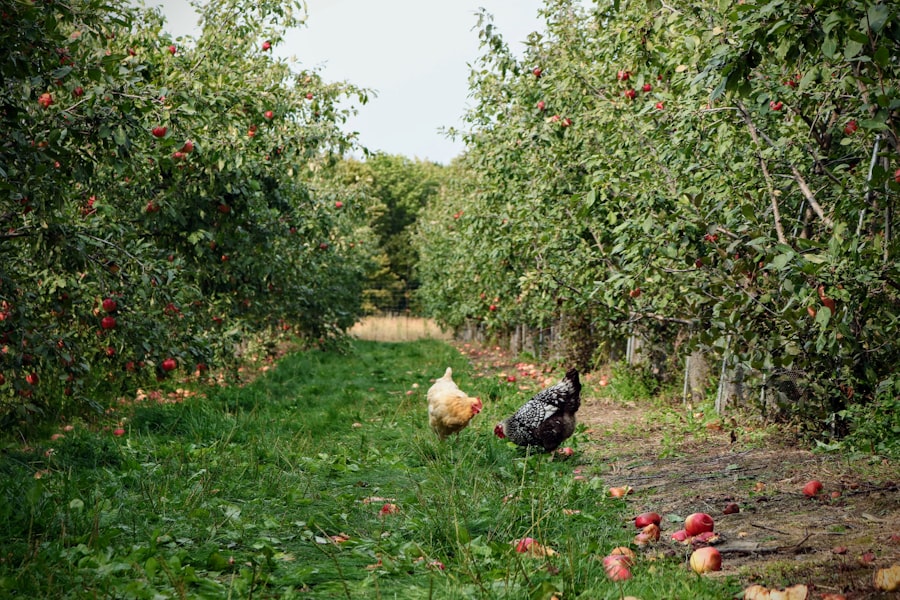Keeping chickens at home has become a growing trend in recent years. More and more people are discovering the joys of having their own flock of chickens, and reaping the benefits that come with it. But is it possible to keep chickens at your house? In this article, we will explore the various aspects of backyard chicken keeping, from the benefits to the legal considerations, and everything in between.
Key Takeaways
- Keeping chickens at home can be a rewarding and enjoyable experience.
- Benefits of keeping chickens include fresh eggs, natural pest control, and fertilizer for your garden.
- Legal considerations for keeping chickens vary by location and may include zoning laws and permit requirements.
- Choosing the right breed of chicken for your backyard depends on factors such as climate, space, and egg production.
- Building a chicken coop with essential features such as proper ventilation and pest control is important for the health and safety of your chickens.
Benefits of Keeping Chickens at Home
There are numerous benefits to keeping chickens at home. One of the most obvious benefits is the fresh eggs that they provide. There is nothing quite like collecting eggs from your own backyard and enjoying them for breakfast. Not only are they delicious, but they are also healthier than store-bought eggs, as they are free from antibiotics and hormones.
Another benefit of keeping chickens is that they can act as natural pest control for your garden. Chickens love to eat insects, slugs, and other pests that can damage your plants. They will happily scratch and peck at the ground, keeping your garden free from unwanted critters.
Additionally, chickens produce high-quality fertilizer for your garden. Their droppings are rich in nitrogen, phosphorus, and potassium, which are essential nutrients for plants. By adding chicken manure to your compost or directly to your garden beds, you can improve soil fertility and promote healthy plant growth.
Legal Considerations for Keeping Chickens
Before you embark on your chicken-keeping journey, it is important to be aware of the legal considerations involved. Zoning laws and permits vary from place to place, so it is crucial to check the regulations in your area before getting chickens.
Some cities have specific rules regarding the number of chickens allowed per household, as well as restrictions on coop size and placement. It is also important to consider noise ordinances, as roosters are not allowed in many urban and suburban areas due to their crowing.
To find out the specific regulations in your area, you can contact your local government or visit their website. There are also online resources and forums where you can connect with other chicken keepers in your area and get advice on navigating the legalities of keeping chickens.
Choosing the Right Breed of Chicken for Your Backyard
When it comes to choosing the right breed of chicken for your backyard, there are several factors to consider. Different breeds have different characteristics, such as egg-laying ability, temperament, and cold or heat tolerance.
If you are primarily interested in fresh eggs, then you will want to choose a breed that is known for its egg-laying capabilities. Some popular egg-laying breeds include Rhode Island Reds, Leghorns, and Australorps. These breeds are known for their consistent egg production and can lay up to 300 eggs per year.
If you have children or are looking for a friendly and docile breed, then you may want to consider a breed like the Buff Orpington or the Sussex. These breeds are known for their calm and gentle nature, making them great pets for families.
It is also important to consider the climate in your area when choosing a breed. Some breeds are better suited for cold climates, while others thrive in hot and humid conditions. Doing some research on different breeds and their specific needs will help you choose the right breed for your backyard.
Building a Chicken Coop: Essential Features and Design Considerations
A well-designed chicken coop is essential for the health and safety of your flock. There are several key features that every coop should have to ensure that your chickens are comfortable and protected.
One important feature is proper ventilation. Good airflow is crucial to prevent moisture buildup and ammonia levels from rising inside the coop. This can be achieved by having windows or vents that can be opened and closed as needed.
Another essential feature is nesting boxes. Chickens need a quiet and private space to lay their eggs, so providing them with nesting boxes will encourage them to lay in the designated area. The general rule of thumb is to have one nesting box for every four to five hens.
The coop should also have a secure and predator-proof design. This means using sturdy materials and ensuring that there are no gaps or holes where predators can enter. It is also important to have a secure door that can be locked at night to keep your chickens safe from predators.
When designing your coop, it is important to consider your space and budget. There are many different coop designs available, ranging from small and simple to large and elaborate. You can choose to build your own coop or purchase a pre-made one, depending on your skills and resources.
Maintaining Your Chicken Coop: Cleaning, Ventilation, and Pest Control

Maintaining a clean and healthy coop is crucial for the well-being of your chickens. Regular cleaning helps prevent the buildup of bacteria and parasites, which can lead to disease and health issues.
Cleaning the coop involves removing soiled bedding, such as straw or wood shavings, and replacing it with fresh bedding. It is important to clean the coop at least once a week, or more frequently if necessary. This will help keep the coop smelling fresh and prevent the spread of diseases.
Proper ventilation is also important for maintaining a healthy coop environment. Good airflow helps remove moisture and ammonia from the coop, which can cause respiratory problems for your chickens. Make sure that windows or vents are open during the day and closed at night to prevent drafts.
Pest control is another aspect of coop maintenance that should not be overlooked. Common pests that can infest chicken coops include mites, lice, and rodents. Regularly inspecting your coop for signs of pests and taking appropriate measures to prevent and treat infestations is essential for the health and comfort of your flock.
Feeding Your Chickens: Tips for a Balanced and Nutritious Diet
Feeding your chickens a balanced and nutritious diet is important for their overall health and egg production. Chickens require a diet that is high in protein, vitamins, and minerals to thrive.
There are several different types of feed available for chickens, including pellets, crumbles, and mash. These feeds are formulated to provide the necessary nutrients for chickens at different stages of life. It is important to choose a feed that is appropriate for the age and breed of your chickens.
In addition to commercial feed, you can also supplement your chickens’ diet with kitchen scraps and garden greens. Chickens enjoy a variety of fruits and vegetables, such as lettuce, carrots, and watermelon. However, it is important to avoid feeding them anything that is toxic to chickens, such as avocado or chocolate.
It is also important to provide your chickens with access to clean water at all times. Chickens need fresh water to stay hydrated and maintain their overall health. Make sure to clean and refill their water containers regularly to prevent the growth of bacteria.
Health and Safety Concerns: Common Diseases and How to Prevent Them
Like any other animal, chickens are susceptible to diseases and health issues. It is important to be aware of common chicken diseases and take preventive measures to keep your flock healthy.
One common health concern for chickens is parasites, such as mites and lice. These pests can cause itching, feather loss, and anemia in chickens. Regularly inspecting your chickens for signs of parasites and treating infestations promptly can help prevent the spread of these pests.
Another common disease in chickens is respiratory infections. These infections can be caused by bacteria or viruses and can lead to symptoms such as coughing, sneezing, and difficulty breathing. Good ventilation in the coop can help prevent respiratory infections, as well as practicing good biosecurity measures.
Biosecurity is an important aspect of keeping your chickens safe and healthy. This involves implementing measures to prevent the introduction and spread of diseases. Some biosecurity practices include quarantining new chickens before introducing them to your flock, disinfecting equipment and footwear, and limiting contact with other poultry.
Egg Production: Understanding the Egg Laying Cycle and Collecting Fresh Eggs
Understanding the egg laying cycle is important for managing your flock and maximizing egg production. The egg laying cycle can vary depending on the breed and age of the chicken.
Most hens start laying eggs around six months of age, although this can vary. The egg laying cycle typically lasts for about two years, with peak production occurring in the first year. After that, egg production gradually declines.
Collecting fresh eggs from your backyard is one of the joys of chicken keeping. It is important to collect eggs regularly to prevent them from becoming dirty or damaged. Eggs should be collected at least once a day, preferably in the morning when they are still warm.
To store fresh eggs, it is best to keep them in a cool and dry place, such as a refrigerator. Eggs should be stored with the pointed end down to help maintain their freshness. It is also important to wash eggs before using them to remove any dirt or bacteria that may be present on the shell.
Is Keeping Chickens Right for You?
Keeping chickens at home can be a rewarding and fulfilling experience. The benefits of fresh eggs, natural pest control, and fertilizer for your garden are just a few of the reasons why people choose to keep chickens.
However, it is important to do your research and consider if chicken keeping is right for you. There are legal considerations, such as zoning laws and permits, that need to be taken into account. Building and maintaining a chicken coop requires time, effort, and resources. And caring for chickens involves daily tasks, such as feeding, cleaning, and monitoring their health.
If you are willing to put in the time and effort, keeping chickens can be a wonderful addition to your home. It is a hobby that can be enjoyed by people of all ages and backgrounds. So, if you have the space and the desire to embark on this adventure, go ahead and start your own backyard flock. Your chickens will thank you with fresh eggs and endless entertainment.
If you’re considering keeping chickens at your house, you’ll definitely want to check out this informative article on chicken coop nest boxes. These essential components of a chicken coop provide a safe and comfortable space for your hens to lay their eggs. The article, found at https://poultrywizard.com/keeping-chickens/chicken-coop-nest-box/, offers valuable insights on the importance of nest boxes, their design, and how to properly maintain them. Whether you’re a beginner or an experienced chicken keeper, this resource will help ensure that your feathered friends have the perfect spot to lay their eggs.
FAQs
Can I keep chickens at my house?
Yes, in many areas it is legal to keep chickens at your house. However, it is important to check with your local government to see if there are any regulations or restrictions in your area.
What are the benefits of keeping chickens?
Keeping chickens can provide a source of fresh eggs, fertilizer for your garden, and entertainment. Chickens are also relatively low maintenance and can help control pests in your yard.
What do I need to keep chickens?
To keep chickens, you will need a coop or shelter for them to sleep in, a secure outdoor area for them to roam and forage, food and water, and bedding material for their coop.
How many chickens can I keep?
The number of chickens you can keep will depend on the size of your property and any local regulations. In general, it is recommended to have at least 2-3 chickens as they are social animals and thrive in groups.
What do chickens eat?
Chickens eat a variety of foods including commercial chicken feed, grains, fruits, vegetables, and insects. It is important to provide a balanced diet for your chickens to ensure their health and egg production.
Do chickens make noise?
Yes, chickens can make noise, particularly when they are laying eggs or if they feel threatened. However, some breeds are quieter than others and proper care and management can help minimize noise levels.
Do I need a rooster to have eggs?
No, you do not need a rooster to have eggs. Hens will lay eggs regardless of whether or not there is a rooster present. However, if you want fertilized eggs to hatch into chicks, you will need a rooster.
Meet Walter, the feathered-friend fanatic of Florida! Nestled in the sunshine state, Walter struts through life with his feathered companions, clucking his way to happiness. With a coop that’s fancier than a five-star hotel, he’s the Don Juan of the chicken world. When he’s not teaching his hens to do the cha-cha, you’ll find him in a heated debate with his prized rooster, Sir Clucks-a-Lot. Walter’s poultry passion is no yolk; he’s the sunny-side-up guy you never knew you needed in your flock of friends!







